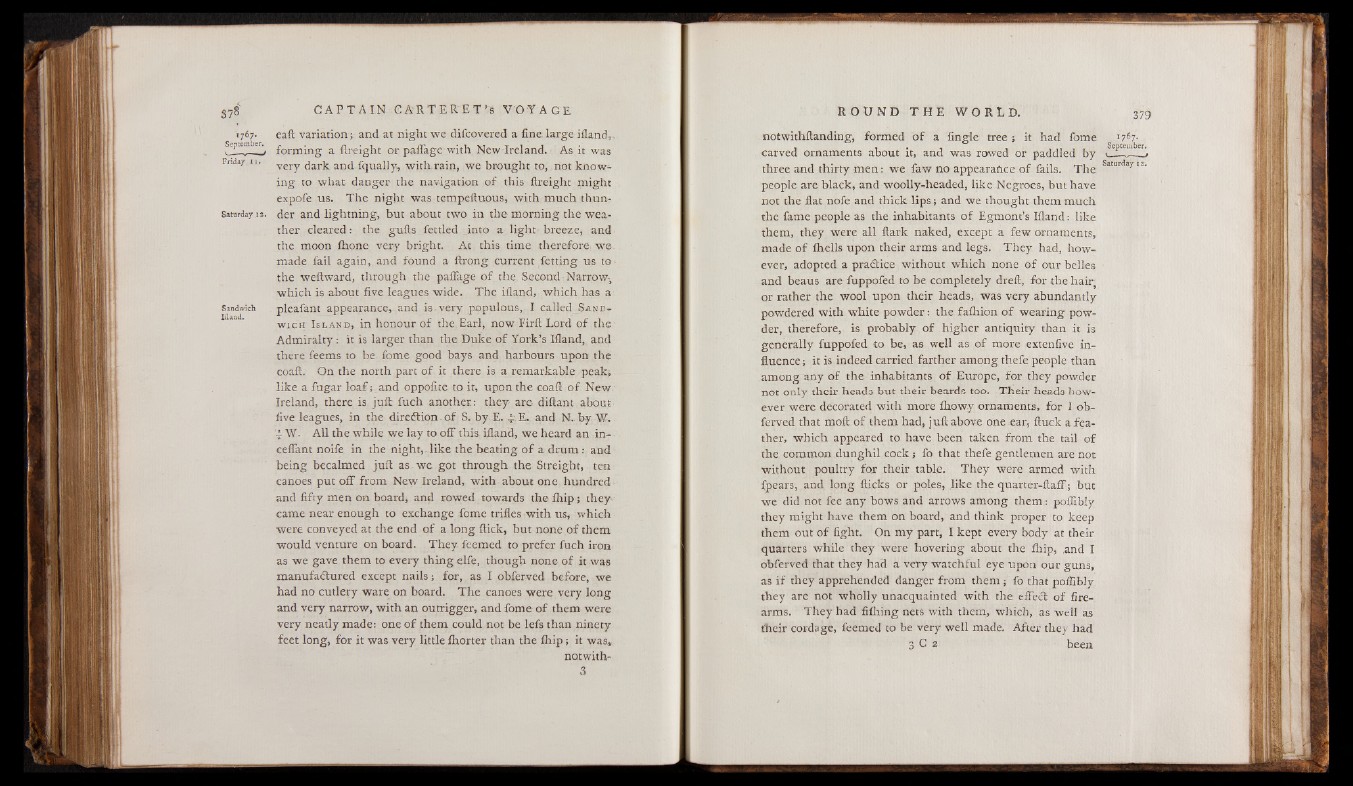
eaft variation;. and at night we difcovered a fine, large ifland,...
forming a ftreight or paffage with New-Ireland. As it was
very dark and fqually, with.rain, we brought to, not knowing
to what danger the navigation o f this ftreight might
expofe us. The night was tempeftuous, with much thun-
Saturday.12. der and lightning, but about two in the morning the weather
cleared: the gufts fettled into a light breeze, and
the moon fhone very bright. At this time therefore we
made fail again,, and found a ftrong current fetting us to
the weftward, through the paflage of the Second-Narrow-,
which is about five leagues wide. The ifland, which has a
Sandwich pleafant appearance,, and is.very populous, I called S a n d w
i c h I s l a n d , in honour o f the.Earl, now Firft Lord of the
Admiralty : it is larger than the Duke of York’s Ifland, and
there feems to be. fome good bays and harbours upon the
coaft. On the north part of it there is a remarkable peak;
like a fugar loaf; and oppofite to it, upon the coaft of. New-
Ireland, there is ju ft fuch another: they are diftant about
five leagues, in the direction o f S. by E . 4 E. and N. by W.
4 W. All the while we lay to off this ifland, we heard an in-
ceffant noife in the night,.like the beating o f a drum: and
being becalmed juft as we got through the Streight, ten
canoes put off from New Ireland, with about one hundred
and fifty men on board; and rowed towards the fhip ; they*
came near enough to exchange fome trifles-with us, which
were conveyed at the end o f a long ftick, but none o f them
would venture onboard. Theyfeemed to prefer fuch iron
as we gave them to every thing elfe, though none of it was
manufactured except nails; for, as I obferved before, we
had no cutlery ware on board. The canoes were very long
and very narrow, with an outrigger, and fome o f them were
very neatly made: one o f them could not be lefs than ninety
feet long, for it was very little fhorter than the fh ip ; it was»
natwith-
3
1767.
September.
Friday 11.
notwithftanding, formed o f a Angle tree ; it had fome D67-
carved ornaments about it, and was rowed or paddled by
three and thirty men: we faw no appearance of fails. The Saturda>' I2-
people are black, and woolly-headed, like Negroes, but have
not the flat nofe and thick lip s ; and we thought them much
the lame people as the inhabitants of Egmont’s Ifland: like
them, they were all ftark naked, except a few ornaments,
made of fhells upon their arms and legs. They had, however,
adopted a practice without which none o f our belles
and beaus are fuppofed to be completely dreft, for the hair,
or rather the wool upon their heads, was very abundantly
powdered with white powder: the fafhion of wearing powder,
therefore, is probably of higher antiquity than it is
generally fuppofed to be, as well as of more extenfive influence;
it is indeed carried farther among thefe people than
among any of the inhabitants of Europe, for they powder
not only their heads but their beards too. Their heads however
were decorated with more Ihow.y ornaments, for 1 obferved
that moft of them had, juft above one ear, ftuek a feather,
which appeared to have been taken from the tail of
the common dunghil cock ; fo that thefe gentlemen are not
without poultry for their table. They were armed with
fpears, and long flicks or poles, like the quarter-ftaff; but
we did not fee any bows and arrows among them.: poflibly
they might have them on board, and think proper to keep
them out o f fight. On my part, I kept every body at their
quarters while they were hovering about the fhip, and I
obferved that they had a very watchful eye upon our guns,
as if they apprehended danger from them f fo that poflibly
they are not wholly unacquainted with the effect of firearms.
They had fifhing nets with them, which, as well as
their cordage, feemed to be very well made. After they had
3 C 2 been